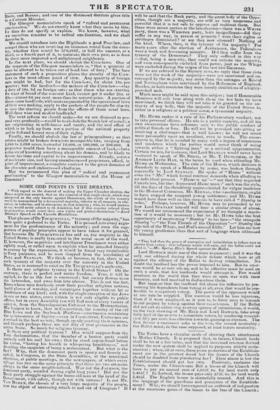SOME ODD POINTS IN THE DEBATES.
" With regard to the demand of making the tipper Chamber elective, the House might rest assured, that on the removal of that single check, which was interposed as the only barrier against Democracy, the whole of the country would be monopolized by a tyrannical majority, inferior in all respects, in edu- cation, in industry, and in enterprise, to that minority ; who, he would venture to say, would never submit to its dominion, but if this country refused them its protection, would assert their own rights and protect themselves."—Lord Stanley's Speech on the Canada Resolutions.
That phrase of De TOCQUEVILLE, " tyranny of the majority," has been quite a godsend to the Tories. It is pressed into every argu- ment Ihr the predominance of the minority ; and even the sup- porters of popular principles appear to have taken it for granted, that because De Teersuemse has said so, the majority in the United States is really tyrannical in the usual sense of the word. If, however, the sagacious and intelligent Frenchman were either rightly read, or called upon to explain what he intended literally to convey by the expression, it would be found very inapplicable to Tory purposes, and be soon dropped from the vocabulary of PEEL and STANLEY. We think so because, in fact, there is no such tyranny of the majority over the minority in the United States, as is assumed to exist on DE TOCQUEVILLE'S authority. Is there any religious tyranny in the United States ? On the contrary, there is perfect and entire freedom. True, it will be replied, as far as the law is concerned ; but society frowns upon the heterodox, and awes him into silence. This is not the fact. Everywhere men fearlessly avow their peculiar religious notions, build places of worship, and congregate together without let or hindrance of any kind; and, with the single exception of the Jews in one or two states, every citizen is not only eligible to public offices, but in every Assembly you will find men of every variety of opinion, from the Supralapsarian Calvinist to the Humanitarian. We happen to know, that in Connecticut, the country of the old Blue Laws and the Say brook Platform—enactments containing the quintessence of bigotry—even in Connecticut, Unitarians are received in the best so: acts, though openly avowing their opinions, and though perhaps there are not fifty of that persuasion in the - entire State. So much for religious tyranny. Is there any political tyranny ? One would suppose from the Tory declamations, that the member of a beaten party could scarcely call his soul his own ; that he stood cap-in-hand before his victor, "bating his breath in whispering humbleness," and dreading the suspicion of being a malecontent. But what is the fact? Why, that the dominant party is openly and fiercely as- sailed, in Congress, in the State AssembliEs, at the municipal elections, at public meetings, in the newspapers, of which every village has two on the same principle that there are two attornies always in the same neighbourhood. Was not the JACKSON, the dominant party, assailed during eight long years ? Did not the Bank party struggle against the brave old man at the head of the Government, with safety, though not with success? Is not Mr. Ise BUREN, the chosen of a very large majority of the people, now the object of unceasing attack in and out of Congress? It will he said that the Bank party, and the great body of the Oppo- sition, though not a majority, are still so very numerous and powerful that it is not safe to oppress and maltreat them. But there were minor parties at the late election—there was a WHITE party, there was a WEBSTER party, both insignificant—did they suffer in any way, in person or property ? were their rights or privileges diminished? or are they now silenced? Nothing of the kind. Where, then, is the tyranny of the majority ? For many years after the election of JEFFERSON, the Federalists were a weak and decreasing minority. Ds1 they suffer from the tyranny of the Democrats? They only suffered in this way —that, being a minority, they could not outvote the majority, and were consequently excluded from power, just as the Whigs were excluded during the reigns of the last two GEORGES. It we are referred to the Slavery riots, we reply that those riots were not the work of the majority—were not sanctioned and en- couraged by the majority, any more than the outrages at Bristol and Nottingham were sanctioned by the Reformers of England. Besides, in both countries they were merely ebullitions of a highly- provoked mob.
Much more might be said upon this subject; but if Honourable Members will only bear along with them the few facts we have mentioned, we think they will not take It for granted on the au- thority of any body, that the majority of the United States is, either in a religious or a political sense, a tyrannical majority.


























 Previous page
Previous page